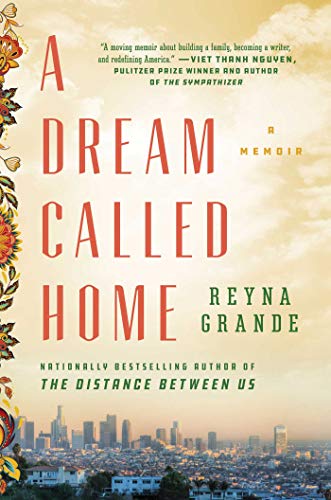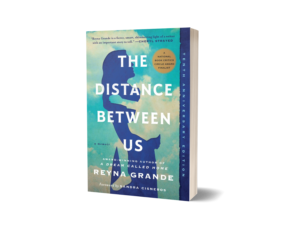Excerpt of A Dream Called Home
This excerpt was published in Poets & Dreamers.
When the new year arrived, I started my second quarter at UC Santa Cruz. To my disappointment, I was the only Latina in my advanced fiction class. My visit to Mexico over Christmas, though painful, had once again reinforced my need to write about the place of my birth. It was by writing about the people I knew, describing their plight, that I could honor their difficult experiences and keep them in my heart and mind. I had to remember each of them, write their stories, share their pain, so that they knew they weren’t alone. The ten days I spent in Iguala had inspired me to write that story collection I claimed I was writing to get the grant from Kresge College. I had gotten the funding, gone on my trip to Mexico, and though the money was given to me with no strings attached, I felt an obligation to follow through on what I had said I would do.
The stories were all set in my hometown, so every assignment I turned in to my fiction teacher was about a world—an experience—neither she nor my classmates knew anything about.“You have a wild imagination,” my teacher said of my story about a flood that devastated the whole neighborhood, forcing the people to spend a week on their roofs, navigating makeshift canoes to retrieve the floating bodies of their dogs, cats, and chickens.“Your work is over-the-top and overwritten,” my teacher said of my story about a young girl who was forced to go to school barefoot because her family was too poor to buy her shoes. And just like I had been, she was physically abused by her teacher for being left-handed.“Your work is too flowery and full of clichés,” my teacher said of my story about a young mother who falls into the community well where she was getting water for the wash, leaving her two children to be raised by their abusive, alcoholic father.
But when it came to the work of white students—who wrote stories about drinking, doing drugs, going to parties, and having sex—the teacher praised them as if they had just written a masterpiece worthy of a Pulitzer.
There were times when I wanted to run out of my classroom and never come back. What am I doing here? I thought. Who do I think I am to even consider that my stories are worth telling?
I thought of my fifth-grade teacher who had rejected my story because it was in Spanish, and by doing so had also rejected who I was. Now I was experiencing the same disapproval. The experiences I put on the page were so foreign to everyone in my class, I might as well have written them in another language.
I could choose to leave. I could choose to drop out of the creative writing program, to be silenced. I could choose to believe that my stories didn’t matter.Or I could fight.
If I allowed rejection to defeat me, my dreams would fester. I would be eaten by maggots. How could I allow that to happen?When I first met Edwin, he had given me a copy of Ayn Rand’s The Fountainhead. Regardless of the author’s controversial political views, I loved her book and appreciated the lesson The Fountainhead had taught me. The story was about a young architect, Howard Roark, who constantly had to fight for his vision of the buildings that he wanted to design; not replicas of what had come before, but his own original work. He had to fight for his designs because almost no one around him understood them. People were always telling him what he should build, how he should create—by copying the old masters and doing the same thing as everyone else. He went up against society and clung to his unique vision, his art, his voice.
In The Fountainhead I came upon a word I had never heard before—“impervious.” When I looked it up in the dictionary I knew that it was a word I wanted to be defined by. I wanted to be unaffected by the scarcity of love around me, unaffected by the lack of support I encountered with my family, and now at UCSC, unaffected by the ignorant remarks of people who had no clue whatsoever about my reality, my truth, or my world. I had to fight for the right to create the kinds of stories I wanted to write.
So when my teacher handed me back my latest story, looking as if it were bleeding from the red ink of her criticism, I put it in my backpack and said, “I’ll see you next week, then.” I rushed into the grove of redwood trees to heal, to be renewed by the scent of hope.
Fortunately, that quarter I also enrolled in Chicano literature, and my teacher, a Chicana named Marta Navarro, reminded me of my community college professor, Diana—she was kind and generous and seemed to care genuinely what happened to her students inside and outside of class. Once, I mentioned to Marta the experiences I was having in my creative writing class. “I feel that no one gets my stories.”
“Why don’t you let me take a look?” she said. The next time I visited her in her office, I brought her one of my stories. When she finished reading it, she said, “Reyna, your writing reminds me of Juan Rulfo.”
“Who?” I asked.
Juan Rulfo, as it turned out, was one of the finest Mexican writers of his generation. Marta gave me a Spanish copy ofThe Burning Plain and Other Stories and Pedro Páramo.
“Rulfo writes about nature as something beautiful and powerful, but also as a menace, something that destroys,” Marta said. “The towns he writes about are poor and forsaken, populated by people who are lonely and destitute. He writes about men who leave and don’t return, floods that devastate neighborhoods. These are things you write about, too, Reyna. It isn’t melodrama. It’s your truth.”
I went home that day and read the books, and when I finished, I felt deeply honored that Marta had compared my work to that of this great writer who had captured, so eloquently, the harsh reality of being poor in Mexico.
“You write like Tomás Rivera,” Marta said to me another time. She handed me a copy of And the Earth Did Not Devour Him and I went home to read the book about migrant workers in the U.S. living an oppressive life of poverty and limited opportunities. With even more conviction, I continued writing, because one day I hoped to write like those incredible authors that Marta so admired, and who were now influencing my own writing with their simple and elegant prose.
Thanks to Marta, I remained confident in my work and managed to become impervious to the criticism of my creative writing teacher and peers.
I returned to my studies with determination, and under Marta’s supervision, I finished the short-story collection I had been working on. “Reyna, why don’t you publish your collection?” Marta said as she handed me her edits for the last of my stories.
“How?” I had never heard that you could publish your own work.
“There are student grants you can apply for that are specifically for special projects,” she said. “Check to see if the Literature Department, or Kresge College, can help.”
I did as she suggested and applied for a grant to self-publish my collection of short stories and was awarded $1,000 to pay for printing costs. For the cover of my book, I used a painting on parchment paper I had bought in Mexico from an indigenous artist selling his
work on the street. I titled my collection, Under the Guamúchil Tree.
Marta was also a Spanish teacher, and I enrolled in her Spanish for Spanish Speakers class, where I learned to speak my native tongue in a way I hadn’t before; that is, “properly.” I had known that the language I had inherited from my parents wasn’t perfect—their grammar and vocabulary reflected their poverty and lack of education—but I hadn’t truly known until then how riddled with “mistakes” our Spanish was. We spoke words that were mispronounced, words that didn’t exist, verbs that were conjugated completely wrong. It was in Marta’s class that I finally learned about accent marks and their correct placement, the right conjugations of regular and irregular verbs. I also discovered that I spoke a third language that described who I was—a mixture of two cultures, two languages, born from the collision of two identities—Spanglish. Not only did I speak incorrect Spanish because of my family’s poverty, but growing up in America had added yet another layer to my native tongue.
Though Marta repeatedly said that there was nothing to be ashamed of—there was no right or wrong way to speak Spanish—I did feel ashamed not speaking it with fluency and mastery. How could I claim it as my mother tongue if the words came out twisted and distorted as if my mouth were a hand-cranked clothes wringer?
“When it comes to Spanish, we all have different ways of expressing ourselves,” Marta said. “There are colloquialisms unique to our upbringing and the places where we’ve lived. To be ashamed of how you speak is to be ashamed of where you’re from, Reyna, and that is not how I want my students to feel.”
I told Marta about Don Oscar and his family. When we lived in Mexico, my mother had a job at a record shop. Her bosses, Don Oscar and his wife, were wealthy Mexicans who looked at us with pity whenever they saw us. They had three children who were always clean and well dressed, who attended private schools, and who were treated with the utmost respect by my mother and other adults. Never mind that they were just kids, the same age as my siblings and me, they were rich and therefore were treated like royalty.
I remembered my shock the first time I heard my mother address Oscar Jr.—who was twelve—as “usted” instead of the informal “tú.” I had never heard a child being addressed as usted until that day.
When I was in Mexico over Christmas, I had been invited to Don Oscar’s for lunch with the family. Sitting there in the living room of their two-story brick house, located in Iguala’s only gated community, with its own security guard, I struggled to feel comfortable around Don Oscar and his wife, but even more so with their children. I kept telling myself that things were different for me now. I was no longer the little girl walking around with lice and tapeworm, barefoot and dressed in rags. I was now a university student, just like the couple’s oldest son, Oscar Jr., who was attending UNAM, Mexico’s largest public university.
But it was my Spanish that remained a barrier. When they spoke, I could hear their wealthy upbringing in the fancy words they used. The words rolled out of their mouths perfectly formed and polished, like shiny marbles. When I spoke, I could see them glance at each other. Ever since I was little, I had sensed that my Spanish was different from theirs, but now I was more aware of it than ever before.
Who cared if I was a university student like their son if I continued to talk like the Mexican actress and comedian María Elana Velasco, who rose to fame by playing La India María, a caricature of an indigenous woman who spoke the most awful Spanish?
Things turned around for me later that day when Oscar Jr. and his sisters put on their favorite English music and asked me to translate the lyrics for them. Drinking a Bailey’s on the rocks for the first time, I listened to the familiar lyrics of George Michael’s “Careless Whispers,” and the music and the alcohol made me feel confident once again. Oscar Jr.’s and his sisters’ Spanish was perfect, unlike mine, but now I could speak a language they struggled with but were desperate to speak, which suddenly put me at their level.
When I translated the lyrics for them, my painful struggle to learn English suddenly seemed worth it just so that I could have this moment—seeing the profound admiration in the eyes of these rich young people who, up until then, had seen me as the poor little girl who deserved their pity and required their charity.
In Marta’s Spanish class that memory of Don Oscar’s children made me work extra hard to learn my mother tongue. “So that next time I see them,” I told Marta as I walked her to her office after class, “I can speak with confidence.”
She listened attentively as I told her about the feelings of inadequacy that came over me when I visited my native country. “Over there, everyone treats me differently, as if I’m no longer Mexican enough. But here, they treat me as if I’m not American enough, either.”
Marta stopped walking and turned to look at me. “Reyna, let me tell you something. It isn’t that you aren’t enough. In fact, the opposite is true.”
I waited for her to explain. What did she mean that I was the opposite of not enough?
“If they treat you differently in Mexico it is because you are different,” Marta said in that soft, tender voice of hers I had grown to love. “You are now bilingual, bicultural, and binational. You are not less. You are more.”
After our talk, as I sat on the bus heading back to my apartment, I thought of what she had said. From the moment I stepped foot in this country, I had felt cut in half, struggling to become an American while at the same time holding on to my Mexican roots, wondering where I belonged, trying to find a home. But now I wondered if Marta was right.
Could it be true that without me knowing I had transformed into twice the girl I used to be?
In Marta’s Chicano literature and Spanish classes, I made a lot of Latino friends—not just the students in her class, but also the authors Marta assigned us to read. Diana had introduced me to the works of Helena María Viramontes, Sandra Cisneros, and Isabel Allende. In Marta’s class, I was exposed to even more Latina writers, and I fell in love with hard-core feminist writers who inspired me to keep fighting for my stories: Ana Castillo, Alicia Gaspar de Alba, Cherríe Moraga, and many more. Through their words, I would hear them tell me, Yes, your stories matter!
Marta introduced me to the work of Sor Juana Inés de la Cruz, a feminist nun who lived in seventeenth-century Mexico—or New Spain, as it used to be called—who wrote some of the most powerful poetry and prose I had read. I felt connected to Sor Juana’s struggle to write and thrive as an artist in a patriarchal society that subjugated and censored her and, on many occasions, had tried to silence her.
Hombres necios que acusáis
a la mujer sin razón,
sin ver que sois la ocasión
de lo mismo que culpáis.
Stupid men, quick to condemn
women wrongly for their flaws,
Never seeing you’re the cause
of all that you blame on them.
Because I was an immigrant, the border was something that had always been part of my life. That fateful day in 1977 when my father decided to emigrate was the day the border changed my life. I was two years old.
A third country. Not Mexico, not the U.S., but the hyphen between Mexican and American. Not my father, not my mother, but the sum of their genes that was greater than their parts. Not English, not Spanish, but the language formed of their commingled blood—Spanglish. The third country was inside me. I was a product of the merging of those two worlds, two people, two languages. My heart was the open wound, la herida abierta.
Anzaldúa wrote: “I am a turtle. Wherever I go, I carry my home on my back.”
It was then that I understood what I needed to do. If I could become a turtle and build a home that I could carry on my back, I would never feel homeless again.


